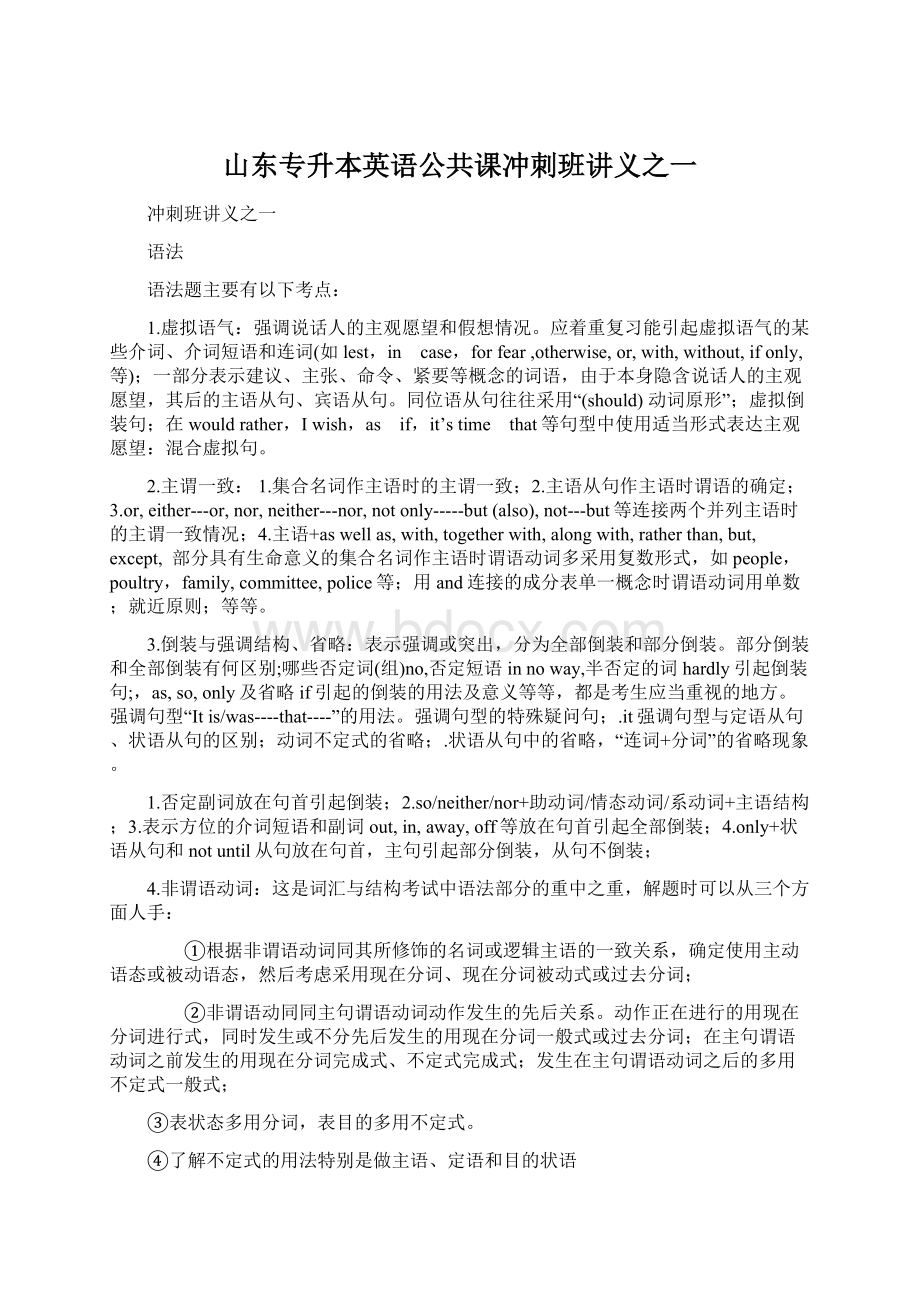山东专升本英语公共课冲刺班讲义之一.docx
《山东专升本英语公共课冲刺班讲义之一.docx》由会员分享,可在线阅读,更多相关《山东专升本英语公共课冲刺班讲义之一.docx(49页珍藏版)》请在冰豆网上搜索。

山东专升本英语公共课冲刺班讲义之一
冲刺班讲义之一
语法
语法题主要有以下考点:
1.虚拟语气:
强调说话人的主观愿望和假想情况。
应着重复习能引起虚拟语气的某些介词、介词短语和连词(如lest,in case,forfear,otherwise,or,with,without,ifonly,等);一部分表示建议、主张、命令、紧要等概念的词语,由于本身隐含说话人的主观愿望,其后的主语从句、宾语从句。
同位语从句往往采用“(should)动词原形”;虚拟倒装句;在wouldrather,Iwish,as if,it’stime that等句型中使用适当形式表达主观愿望:
混合虚拟句。
2.主谓一致:
1.集合名词作主语时的主谓一致;2.主语从句作主语时谓语的确定;3.or,either---or,nor,neither---nor,notonly-----but(also),not---but等连接两个并列主语时的主谓一致情况;4.主语+aswellas,with,togetherwith,alongwith,ratherthan,but,except, 部分具有生命意义的集合名词作主语时谓语动词多采用复数形式,如people,poultry,family,committee,police等;用and连接的成分表单一概念时谓语动词用单数;就近原则;等等。
3.倒装与强调结构、省略:
表示强调或突出,分为全部倒装和部分倒装。
部分倒装和全部倒装有何区别;哪些否定词(组)no,否定短语innoway,半否定的词hardly引起倒装句;,as,so,only及省略if引起的倒装的用法及意义等等,都是考生应当重视的地方。
强调句型“Itis/was----that----”的用法。
强调句型的特殊疑问句;.it强调句型与定语从句、状语从句的区别;动词不定式的省略;.状语从句中的省略,“连词+分词”的省略现象。
1.否定副词放在句首引起倒装;2.so/neither/nor+助动词/情态动词/系动词+主语结构;3.表示方位的介词短语和副词out,in,away,off等放在句首引起全部倒装;4.only+状语从句和notuntil从句放在句首,主句引起部分倒装,从句不倒装;
4.非谓语动词:
这是词汇与结构考试中语法部分的重中之重,解题时可以从三个方面人手:
①根据非谓语动词同其所修饰的名词或逻辑主语的一致关系,确定使用主动语态或被动语态,然后考虑采用现在分词、现在分词被动式或过去分词;
②非谓语动同同主句谓语动词动作发生的先后关系。
动作正在进行的用现在分词进行式,同时发生或不分先后发生的用现在分词一般式或过去分词;在主句谓语动词之前发生的用现在分词完成式、不定式完成式;发生在主句谓语动词之后的多用不定式一般式;
③表状态多用分词,表目的多用不定式。
④了解不定式的用法特别是做主语、定语和目的状语
⑤了解哪些动词后常跟动名词做宾语
⑥了解.独立主格:
一般说来,在句子中没有连接词的情况下,逗号是无力连接两个句子的,其中一个分句要么是非谓语形式,要么是独立主格结构。
这两种结构都作状语,不同的是独立主格结构有自己的逻辑主语,掌握多种独立主格形式。
5.时态:
英语中一共有16个时态,考试中出现最多的考点是将来完成时、现在完成时、过去完成时和完成进行时。
针对这一题型,考生首先要抓住的就是时间状语,是现在时间、将来时间还是过去时间?
是短暂时间还是延续性时间?
6.名词性从句:
主语从句。
同位语从句、宾语从句也应适当复习。
7形容词性的定语从句是考核的重点,用什么引导词,引导词前面的介词形式,引导词在从句中做什么成分(做宾语。
主语还是状语等),从句的语序等等均有可能成为考点。
8状语从句
动名词
●动名词在句中起名词的作用,可以充当主语、表语、宾语(动词宾语或介词宾语)。
它可以有自己的定语、宾语或状语。
1)动名词作主语
____inanatmosphereofsimplylivingwaswhatherparentswishedfor.
A)ThegirltobeeducatedB)Thegirleducated
C)Thegirl'sbeingeducatedD)Thegirlwaseducated
动名词和不定式都可以做主语。
不定式做主语表示具体的动作,动名词做主语则可以表示抽象或一般性的动作或情况。
根据句意,这个女孩在朴素的生活环境中接受教育是她的父母所希望的,接受教育不是具体的一次性动作,因此用动名词,答案为C。
●当动名词做主语时,我们常用先行词it作形式主语,而把真正的主语动名词放到句尾,特别要注意如下结构:
Itisuseless(nouse,nogood,noharm)doing...Itisawasteoftimedoing...Itisworthwhiledoing...
Itisnousecryingoverspiltmilk.
Itisawasteoftimediscussingsuchmatterswithhim.
Itisnogoodleavingtoday'sworkfortomorrow.
●2)动名词作动词宾语
●a)英语中有些动词后面只能跟动名词作它的宾语。
这类动词常见的有:
admit,advice,anticipate,appreciate,avoid,consider,delay,deny,dislike,enjoy,escape,excuse,fancy,favor,finish,imagine,include,keep,mind,miss,postpone,practise,prevent,propose,resist,risk,suggest等。
【例如】
Mikeoftenattemptstoescapebeingfinedwheneverhebreakstrafficregulations.
ThedoctorsuggestedthatIavoidsmokinganddrinkingforamonth.
Wouldyoumindopeningthewindow?
Themurdererdeniedkillingtherichman
Iwouldappreciate____itasecret.
A)yourkeepingB)youtokeepC)thatyoukeepD)thatyouwillkeep
appreciate后面一般加动名词做宾语,动名词可以有自己的逻辑主语,因此答案为A。
Thatyoungguystilldenies____thefirebehindthestore.
A)tostartB)havingstartedC)startD)tohavestarted
deny后面加动名词作宾语,而且引发火灾是在否认这一动做之前,所以用动名词的完成式,答案为B。
●b)动名词在demand,deserve,need,require,want等动词后面作宾语时,表示被动的意思。
【例如】
Myshoesneedmending.
Thefollowinglanguagepointsdeservementioning.
Thismatterdemandsdiscussing.
Yourhairwants____.Youhadbetterhaveitdonenow.
A)cutB)tocutC)cuttingD)beingcut
Want,need,require等动词后经常加动名词做宾语,表示被动的意思,故答案为C。
●c)有些短语动词和结构后面也要求跟动名词作宾语。
这样的短语动词常见的有:
feellike,giveup,goon,object/objectionto,putoff,keepon,insiston,leaveoff,lookforwardto,thinkof,can'thelp,be/getusedto,spend...in,havedifficultyin,havetrouble/ahardtimein,therebenoneed,confessto等。
【例如】
Doyoufeellikegoingoutfordinnerwithmetonight?
Chinesepeoplearelookingforwardtoholdingthe27thOlympicgames.
Iamusedtogoingtobedlateandgettinguplate.
Althoughpunctualhimself,theprofessorwasquiteused____lateforhislecture.
A)tohavestudentsB)forstudents'beingC)forstudentstobeD)tostudents'being
be/getusedtodoing表示习惯于干什么,是固定用法,因此答案为D。
Ihavenoobjection____yourstoryagain.
A)tohearB)tohearingC)tohavingheardD)tohaveheard
object/objectiontodoing是固定用法,因此A和D可以排除。
动名词的完成式表示其动作发生在谓语动词的动作之前,而句中听的动作还没有进行,因此用动名词的一般式,答案为B。
●d)有些动词既可以加动名词,又可以加不定式,两者在意义上有差别。
这些动词有:
forget,like,remember,regret,try等。
forgettodo:
忘记去做某事,还没有做。
Don'tforgettotakeanumbrellawhenyougoout.
forgetdoing:
忘了做过某事。
I'llneverforget____youforthefirsttime.
A)tomeetB)tohavemetC)meetingD)havingtobemeeting
forgettodo表示忘记去做某事,还没有做。
forgetdoing表示忘了做过某事。
根据句意:
我永远不会忘记第一次遇到你,遇到的动作已经发生,应选择动名词,答案为C.remembertodo:
记住去做某事,还没有做。
【例如】
Iwillremembertowritetoyouoften.
IfIhadremembered____thewindow,thethiefwouldnothavegotin.
A)tocloseB)closingC)tohaveclosedD)havingclosed
remembertodo表示记得要做某事,还没有做。
根据句意,如果我记得去关窗户,小偷就不会进来,窗户很明显没有关,所以用不定式,答案为A。
rememberdoing:
记得做过某事。
Irememberedputtingmywalletinthebag,butIcouldnotfindit.
regrettodo:
遗憾做某事,经常用:
regrettosayIregrettosaythatIcan'tacceptyourinvitation.
regretdoing:
后悔做过某事。
Iregretnothavingtakenyouradvice.
trytodo:
尽力做某事。
Oneshouldtrytodoeverythingwell.
trydoing:
试着做某事。
Itriedcooking,butIfailed.
3)动名词作介词宾语动名词作介词宾语,并且和介词构成介词短语。
Annneverdreamsof____forhertobesentabroadverysoon.
A)therebeingachanceB)theretobeC)therebeachanceD)beingachance
of为介词,后面接动名词做宾语,因此B和C都可以排除。
另外,根据句意:
安妮从来没有梦想过她有一个很快被送出国的机会,介词后面含有“有”的意思,用therebe结构表达,故正确答案为A.
动名词练习题
1)Markoftenattemptstoescape____wheneverhebreakstrafficregulations.
A)havingbeenfinedB)tohavebeenfinedC)tobefinedD)beingfined
2)Mywifesaidinherletterthatshewouldappreciate____fromyousometime.
A)tohaveheardB)tohearC)forhearingD)hearing
3)Thethieftookawaythewoman'swalletwithout____.
A)beingseenB)seeingC)himseeingD)seeinghim
4)Peopleappreciate____withimbecausehehasagoodsenseofhumor.
A)toworkB)tohaveworkedC)workingD)haveworking
5)I'veenjoyed____totalkwithyou.
A)tobeableB)beingableC)tobeenableD)ofbeingable
6)Noonecanavoid____byadvertisements.
A)tobeinfluencedB)beinginfluencedC)influencingD)havinginfluence
7)Theyareconsidering____beforethepricesgoup.
A)ofbuyingthehouseB)withbuyingthehouse
C)buyingthehouseD)tobuythehouse
8)Hethoughtthat____.
A)theeffortdoingthejobwasnotworth
B)theeffortwasnotworthindoingthejob
C)itwasnotworththeeffortdoingthejob
D)itwasnotworththeeffortbydoingthejob
9)IfIhadremembered____thedoor,thethingswouldnothavebeenstolen.
A)tolockB)lockingC)tohavelockedD)havinglocked
10)Yourshirtneeds____.You'dbetterhaveitdonetoday.
A)ironB)toironC)ironingD)beingironed
11)Youcan'thelp____commercials;everyfewminutestheprogramisinterruptedtogiveyouoneadvertisementoranother.
A)tohearB)tobeheardC)hearingD)withhearing
12)Mytransistorradioisn'tworking.It____.
A)needrepairingB)needstorepairC)needsrepairingD)needtoberepaired
13)Itisnouse____menottoworry.
A)youtellB)yourtellingC)foryoutohavetoldD)havingtold
14)Heisverybusy____hispapers.Heisfartoobusy____callers.
A)towrite...toreceiveB)writing...toreceive
C)writing...receivingD)towrite...forreceiving
15)Thesuspectatlastadmitted____stolengoodsbutdenied____them.
A)receiving...sellingB)toreceive...tosell
C)toreceiving...tosellingD)tohavereceived...tohavesold
16)Sheapologizedfor____tocome.
A)hernotbeingableB)herbeingnotable
C)notbeingableD)thatshe'snotableto
17)Ireallyappreciate____tohelpme,butIamsurethatIcanmanagebymyself.
A)youtoofferB)thatyouoffer
C)yourofferingD)thatyouareoffering
18)Pleasestop____,boys,Ihavesomethingimportantto____you.
A)saying...talkB)telling...say
C)talking...speakD)talking...tell
19)Tony,wouldyougoandseeifSamhasanydifficulty____histaperecorder?
A)tofixB)fixingC)forfixingD)fix
20)“Whyisn'tNancygoingtomeetus?
”“It'smyfault.Iforgotallabout____her.”
A)telephoningtoB)totelephoneC)totelephonetoD)thetelephoningto
21)“Whywereyoulate?
”“Ihadahardtime____upthismorning.”
A)togetB)getC)gotD)getting
22)Iremember____tohelpusifweevergotintotrouble.
A)onceofferingB)himonceofferingC)himtoofferD)toofferhim
23)Johnregretted____tothemeetinglastweek.
A)notgoingB)nottogoC)nothavingbeengoingD)nottobegoing
24)Itisdifficulttogetused____inatentafterhavingasoft,comfortablebedtolieon.
A)sleepB)tosleepingC)sleptD)tosleep
25)Hegivespeopletheimpression____manypoems.
A)ofhavingwrittenB)tohavewrittenC)ofbeingwrittenD)towrite
26)Doyoufeellike____outorwouldyourather____dinnerathome?
A)going...tohaveB)togo...tohaveC)togo...havingD)going...have
27)Priorto____theformalspeech,firsthewillintroducehimself.
A)deliveringB)deliverC)beingdeliveringD)beingdelivered
28)Idon'tmind____bybus,butIhate____inqueues.
A)totravel...standingB)havingtraveled...standing
C)traveling...tostandD)traveling...standing
29)Whatabout____doublequantitiesofeverythingtoday?
Wehavehardlytimetogo____nextweek.A)buying...toshopB)buy...shoppingC)buying...shoppingD)tobuy...shopping
30)Wehadsometrouble____thehouseandnobodyseemed____whereitwas.
A)infinding...knowingB)finding...toknowC)tofind...knowingD)tofind...toknow
虚拟语气的重点
1.一些常见的虚拟语气的句型或结构。
2.虚拟语气的特殊形式,即用来表示要求、建议、命令、提议、意愿等的主语从句、宾语从句、表语从句和同位语从句中的虚拟形式。
3.主从句表示不同的时间概念、事实或假设情况,从而交错成为复合虚拟语气。
4.含蓄条件句中的虚拟语气的表示愿望的虚拟形式。